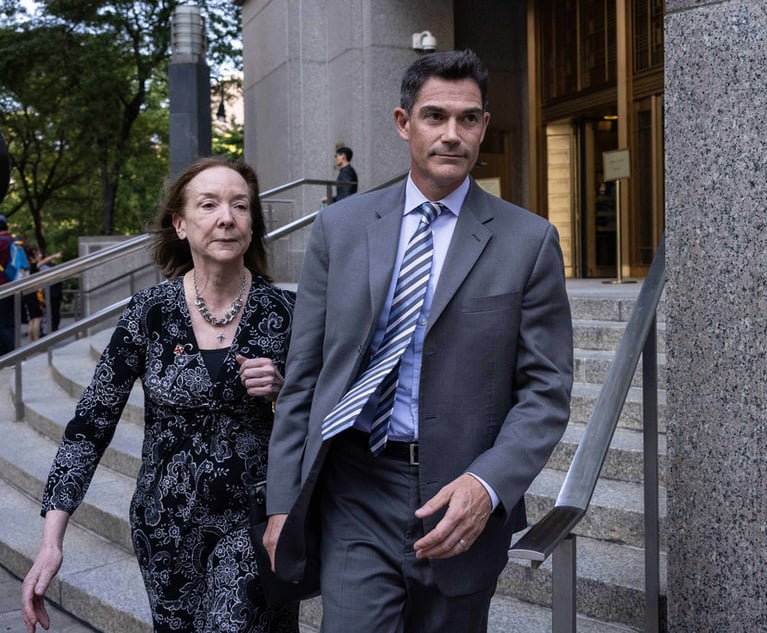 (l-r) Mayling Blanco, Katey Fardelmann, and Lucy Hoffman of Norton Rose Fulbright. Courtesy photos
(l-r) Mayling Blanco, Katey Fardelmann, and Lucy Hoffman of Norton Rose Fulbright. Courtesy photos Foreign Extortion Prevention Act: What US Entities Should Know and Why It's Relevant Today
This article discusses the recently enacted Foreign Extortion Prevention Act, which—unlike the Foreign Corrupt Practices Act—focuses on the demand-side of bribe payments. But will FEPA also create more potential exposure for U.S. entities? What should U.S. companies do today to prepare?
April 09, 2024 at 10:28 AM
8 minute read
For decades, it has irked those subject to the Foreign Corrupt Practices Act (FCPA) that those who demanded payments appeared to escape the crushing consequences. The FCPA was first enacted by Congress in 1977 to combat the wide-ranging corruption that was seen as unsettling free-markets and hindering democratic stability. Foreign Corrupt Practices Act of 1977, 15 U.S.C. §§78dd-1, et seq; see also U.S. Department of Justice and Securities and Exchange Commission, A Resource Guide to the U.S. Foreign Corrupt Practices Act (Second Edition). The law prohibits U.S. companies, persons and issuers as well as foreign persons and businesses acting within the U.S. territory from making or promising anything of value to foreign officials to obtain or retain business or an improper business advantage. Yet the FCPA has one significant limiting factor: it only reaches the supply side of bribes to foreign officials.
By leaving the demand-side of bribes unaddressed, U.S. prosecutors were forced to resort to more creative devices to pursue a foreign official for bribery, which was unusual but not unheard of. U.S. prosecutors often relied on traditional criminal statutes, such as money laundering or conspiracy, which often presented challenges such as the need to establish a U.S. nexus. Perhaps given these challenges, prosecution of foreign officials was less common than prosecution of the companies paying bribes.
This content has been archived. It is available through our partners, LexisNexis® and Bloomberg Law.
To view this content, please continue to their sites.
Not a Lexis Subscriber?
Subscribe Now
Not a Bloomberg Law Subscriber?
Subscribe Now
NOT FOR REPRINT
© 2025 ALM Global, LLC, All Rights Reserved. Request academic re-use from www.copyright.com. All other uses, submit a request to [email protected]. For more information visit Asset & Logo Licensing.
You Might Like
View All
'You Became a Corrupt Politician': Judge Gives Prison Time to Former Sen. Robert Menendez for Corruption Conviction
5 minute read

Menendez Asks US Judge for Bond Pending Appeal of Criminal Conviction

Jona Rechnitz Sentencing in Federal Court Is Postponed to June
Law Firms Mentioned
Trending Stories
- 1Uber Files RICO Suit Against Plaintiff-Side Firms Alleging Fraudulent Injury Claims
- 2The Law Firm Disrupted: Scrutinizing the Elephant More Than the Mouse
- 3Inherent Diminished Value Damages Unavailable to 3rd-Party Claimants, Court Says
- 4Pa. Defense Firm Sued by Client Over Ex-Eagles Player's $43.5M Med Mal Win
- 5Losses Mount at Morris Manning, but Departing Ex-Chair Stays Bullish About His Old Firm's Future
Who Got The Work
J. Brugh Lower of Gibbons has entered an appearance for industrial equipment supplier Devco Corporation in a pending trademark infringement lawsuit. The suit, accusing the defendant of selling knock-off Graco products, was filed Dec. 18 in New Jersey District Court by Rivkin Radler on behalf of Graco Inc. and Graco Minnesota. The case, assigned to U.S. District Judge Zahid N. Quraishi, is 3:24-cv-11294, Graco Inc. et al v. Devco Corporation.
Who Got The Work
Rebecca Maller-Stein and Kent A. Yalowitz of Arnold & Porter Kaye Scholer have entered their appearances for Hanaco Venture Capital and its executives, Lior Prosor and David Frankel, in a pending securities lawsuit. The action, filed on Dec. 24 in New York Southern District Court by Zell, Aron & Co. on behalf of Goldeneye Advisors, accuses the defendants of negligently and fraudulently managing the plaintiff's $1 million investment. The case, assigned to U.S. District Judge Vernon S. Broderick, is 1:24-cv-09918, Goldeneye Advisors, LLC v. Hanaco Venture Capital, Ltd. et al.
Who Got The Work
Attorneys from A&O Shearman has stepped in as defense counsel for Toronto-Dominion Bank and other defendants in a pending securities class action. The suit, filed Dec. 11 in New York Southern District Court by Bleichmar Fonti & Auld, accuses the defendants of concealing the bank's 'pervasive' deficiencies in regards to its compliance with the Bank Secrecy Act and the quality of its anti-money laundering controls. The case, assigned to U.S. District Judge Arun Subramanian, is 1:24-cv-09445, Gonzalez v. The Toronto-Dominion Bank et al.
Who Got The Work
Crown Castle International, a Pennsylvania company providing shared communications infrastructure, has turned to Luke D. Wolf of Gordon Rees Scully Mansukhani to fend off a pending breach-of-contract lawsuit. The court action, filed Nov. 25 in Michigan Eastern District Court by Hooper Hathaway PC on behalf of The Town Residences LLC, accuses Crown Castle of failing to transfer approximately $30,000 in utility payments from T-Mobile in breach of a roof-top lease and assignment agreement. The case, assigned to U.S. District Judge Susan K. Declercq, is 2:24-cv-13131, The Town Residences LLC v. T-Mobile US, Inc. et al.
Who Got The Work
Wilfred P. Coronato and Daniel M. Schwartz of McCarter & English have stepped in as defense counsel to Electrolux Home Products Inc. in a pending product liability lawsuit. The court action, filed Nov. 26 in New York Eastern District Court by Poulos Lopiccolo PC and Nagel Rice LLP on behalf of David Stern, alleges that the defendant's refrigerators’ drawers and shelving repeatedly break and fall apart within months after purchase. The case, assigned to U.S. District Judge Joan M. Azrack, is 2:24-cv-08204, Stern v. Electrolux Home Products, Inc.
Featured Firms
Law Offices of Gary Martin Hays & Associates, P.C.
(470) 294-1674
Law Offices of Mark E. Salomone
(857) 444-6468
Smith & Hassler
(713) 739-1250






